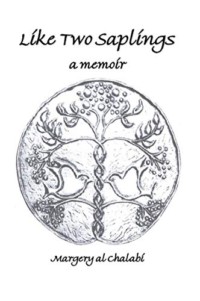Title: Like Two Saplings
Author: Margery al Chalabi
Publisher: Dorrance Publishing
ISBN: 978-1480999800
Genre: Memoir
Pages: 182
Reviewed by: Barbara Bamberger Scott
Pacific Book Review
When a devoted couple faces the end of one life, there is much that should be done and much that can be said, as evidenced in this emotive memoir by Margery al Chalabi.
Margery was the first member of her family to attend college; after attaining a degree in Architecture, she went to Athens to study for a masters in Urban Planning and Regional Economics. There, in that beautiful ancient ambience, she met Suhail al Chalabi, a remarkable young Iraqi with a degree in their shared field of architecture from MIT. The two gradually found one another irresistible, moved in together and were married shortly afterward.
In 2014, 52 years later, the couple had been batting Suhail’s chronic leukemia for more than ten years. Then they learned that the disease had become acute, an almost certain death sentence. He and Margery decided to try a new intervention – the eradication of the leukemia-causing gene – but for various reasons, he was found ineligible for that treatment, and after further chemo and other interventions, he was clearly failing. He was in the hospital almost as much as he was at home, while Margery took over their joint professional ventures, spending as much time as possible with him. In February 2015, after a night spent together in his hospital bed, Suhail passed away.
Al Chalabi’s recollections combine her innate intellectual and organizational abilities with a sense of passion and genuine caring for the great love of her life. She includes emails, many of them posthumous paeans to her late husband, who was a noteworthy mover and shaker in his professional field of city planning in Chicago. Part of her story is told in a series of black and white photos of the young couple as friends, newlyweds, world travelers, and sailors on the local waters. She describes their last brief conversation tenderly – it began with Suhail directing her in a few words to name and save certain computer files such as “End of life” and “Well lived, loved.” The latter portion of her reminiscences is necessarily painful at times. She must bravely face the preparations for remembrance ceremonies for her well-known spouse, making sure his own wishes are adhered to strictly. She depicts Suhail and herself as nearly twins, evoking the book’s cover – two trees intertwined – and its title, as tender as it is true.
Like Two Saplings is beautifully and powerfully written. Couples both young and old will derive much wisdom from al Chalabi’s loving chronicle of a juncture in life that may be faced by many, and can be met with kindness and courage.


